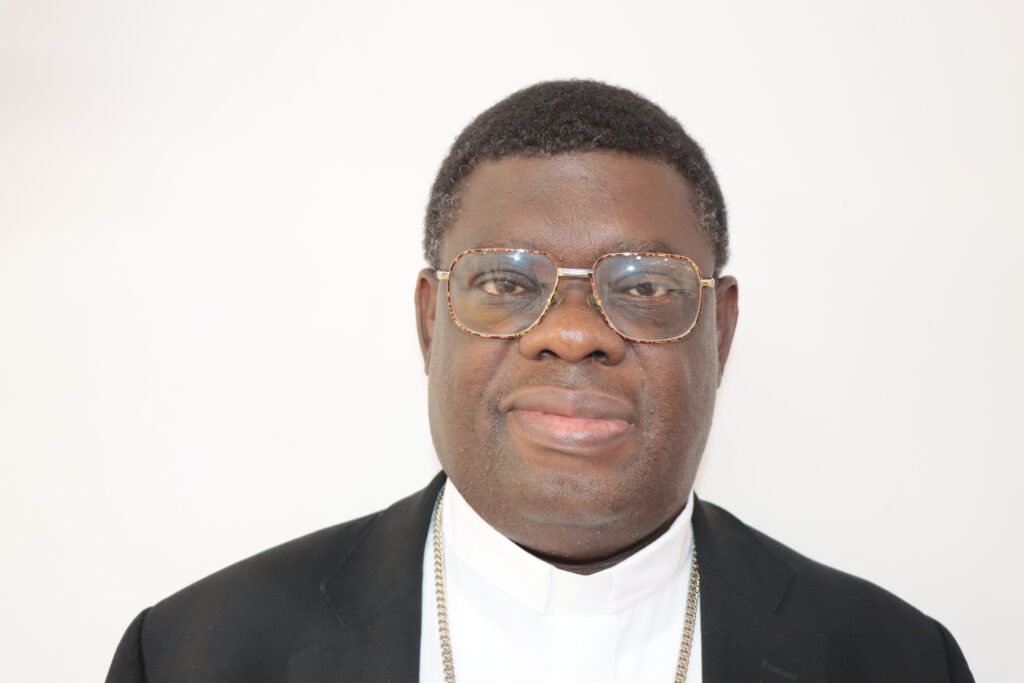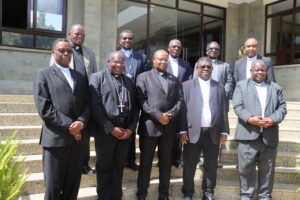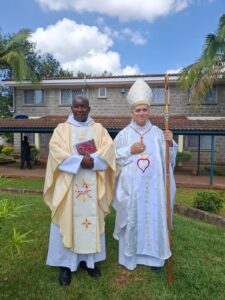AMECEA: Family Life and SCCs, Ecclesia Models that Promote Synodality in AMECEA Region, Says AMECEA Chairman

Bishop Charles Sampa Kasonde
Sr. Jecinter Antoinette Okoth, FSSA
The foundation of synodality in the Association of Member Episcopal Conferences in Eastern Africa (AMECEA), is the recognition of the significance of family life and the existence of well-established Small Christian Communities (SCCs) in the region, AMECEA chairman has said during a webinar session held on Thursday, March 14.
The webinar aimed to reflect on the experience of the themes that emerged during the first phase of the synodal journey that was held last year October in Rome.
Reflecting on the scriptures and the social teachings of the Catholic Church on the significance of family as the foundational institution of society ordained by God, Bishop Charles Sampa Kasonde of Solwezi Diocese, Zambia highlighted that the bishops in AMECEA region recognize the importance of marriage and family as a Sacrament and covenant of love between a man and a woman.
He adds that, from the first sitting of the Synodal Assembly in the region, marriage, and family life were captured in the report as fundamental to the people of God in the region.
“The family is a vital cell and the future of the Church and society which has, according to the plan of God, a significant mission to fulfil,” said Bishop Kasonde who was one of the panelists during the webinar themed: Church in Africa; becoming synodal in mission, adding that the family’s task is in fourfold in forming a community of persons that is “serving life; participating in the development of the society; and sharing in the life and mission of the Church.”
From the Post-Synodal Apostolic Exhortation Ecclesia in Africa by (St) Pope John Paul II, on the Church in Africa and its evangelization mission towards the year 2000, the now saint noted that “Marriage is a state of life, a way of Christian holiness, a vocation which is meant to lead to the glorious resurrection and to the Kingdom, where “they neither marry nor are given in marriage.”
The document that was published after the special synod for Africa and which presented the history of evangelization and the challenges in the continent highlighted further that, “Marriage demands an indissoluble love, and through stability, it can contribute effectively to the complete fulfilment of the spouses’ baptismal vocation.”
While addressing over 100 online participants during the Thursday webinar, the Local Ordinary of Solwezi Diocese emphasized that in conformity with the African significance of marriage and family life, “AMECEA Church is dedicated to safeguarding, advocating for, nurturing, and providing pastoral support for this foundational institution of marriage.”
Additionally, “the concept of ubuntu, prevalent in African philosophy, emphasizes interconnectedness and mutual support within communities, resonating with biblical teachings on loving one’s neighbor as oneself (Mark 12:31),” he said.
Speaking about SCCs as another cornerstone that strengthens synodality in the region, the AMECEA Chairman underscored that this method which brings together 10 to 15 families and meet weekly, to reflect on the word of God, “fosters the spirit of synodality within the region and encompasses nurturing a culture of dialogue, active participation, and collective responsibility.”
According to Bishop Kasonde, SCCs and family life can enhance synodality in the region through “formation and education, creating spaces within families and SCCs for open and respectful dialogue, fostering a culture of shared decision-making and collaborative leadership within families and SCCs, and bringing on board all members of families and SCCs, including women, youth, and marginalized groups, to have the opportunity to participate fully and actively in the life and mission of the Church.”
Besides, he continued, families and SCCs need to be encouraged to see themselves as missionary disciples, called to bear witness to the Gospel in their communities and beyond, there should be regular participation in liturgical celebrations, knowing that “Prayer is the life of the new heart,” and at the same time leaders within families and SCCs should be trained to facilitate processes of synodality, promote pastoral care, accompany others on their faith journey and provide ongoing support and mentorship to empower leaders to fulfill their roles effectively.
By embracing these approaches including collaboration with pastoral structures of the Church, the Zambian Prelate concluded, “Families and SCCs in the AMECEA region can promote a Church that is self-reliant, self-ministering, and self-propagating, hence becoming a vibrant expression of synodality, fostering a culture of communion, participation, and mission in the Church and society.”


